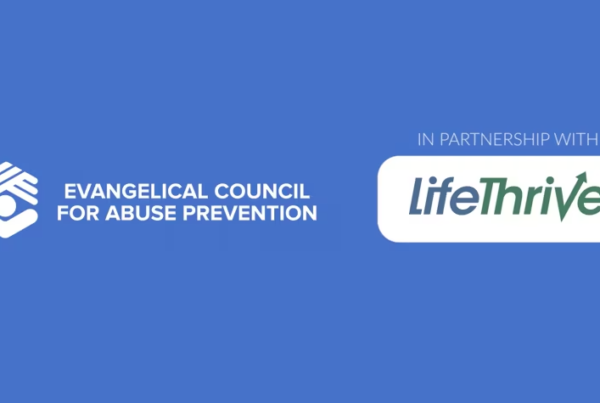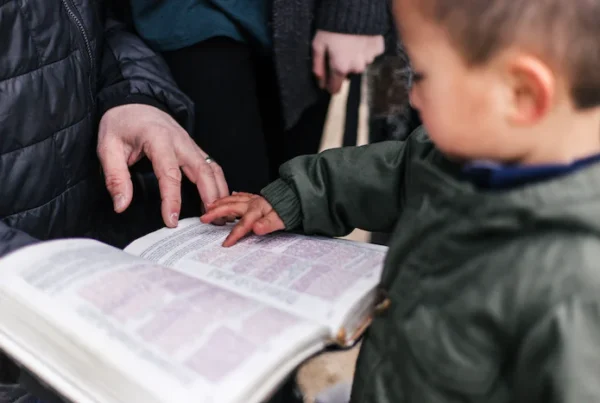A Critical Factor in Child Safety
The Evangelical Council for Abuse Prevention was created in 2019 to help leaders protect the vulnerable in ministry settings through the application of standards, accreditation compliance, and the creation of resources to help prevent abuse. The first step in protecting the vulnerable is developing a robust set of policies and procedures that will keep kids safe. However, simply putting words on paper will do nothing to protect vulnerable kids from predators who wish to do them harm. Beyond policies and procedures, organizations must ensure that those guidelines are followed in practice as they serve Children in their various programs. A Child Safety Coordinator (CSC) is an indispensable role for every organization that serves Children. This white paper is designed to introduce the CSC role to ministries establishing or improving their Child Protection Program (CPP), including those pursuing ECAP accreditation.
There are five basic responsibilities of the CSC (which will be developed in more detail below):
- The CSC leads the Child Safety Team.
- The CSC is an expert on the organization’s Child Protection Program (CPP).
- The CSC ensures continued implementation of your organization’s CPP.
- The CSC is your organization’s coordinator to ensure proper reporting protocols are followed when an abuse or neglect allegation is reported.
- The CSC will serve with the Crisis Response Team in the event of an incident.
The CSC’s focus is to support leaders and ministries in creating safe environments for Children and youth. The role consists of supporting the staff and volunteers, and to monitor and assess practices for alignment with organizational policies and ECAP standards. The CSC is essential to ensure that ministries consistently apply principles of abuse prevention, and to create peace of mind for leaders and parents. The CSC will also encourage sustainability to ensure that safety programs will continue as designed. The CSC and Child Safety Team operate under the authority of ministry leaders, ensuring Child Safety is given due consideration in all Children’s programming and activities.
Why A New Role?
The CSC plays a unique role as a single-focus coordinator within an organization committed to Child Safety. Existing staff and volunteer roles typically focus on portions of the programming, except for the leaders, whose perspective is necessarily at a direction and decision-making level. In almost every ministry situation, no one person has purview over all programming that involves Children plus the time and attention available to properly ensure consistent Child protection practices. The appointment of a Child Safety Coordinator is the leadership team dedicating the necessary resources in the form of a staff or volunteer to the oversight of the ministry of Child protection.
A Child Safety Coordinator (CSC) occupies a unique and critical role. The CSC should be thought of as your organization’s Child Safety resident expert, with detailed knowledge of your organization’s Child Protection Policy. This person does not necessarily have to play a role in researching or developing your CPP, but it is their duty to see to it that the CPP is applied during youth and Children’s ministry activities. They should be the “go-to” person for Parents and Workers with questions about any aspect of the CPP.
Each person in your own organization plays a valuable role, but not all of them can be expected to know the specifics of the CPP or response measures. The CSC serves to come alongside all the Workers in your organization to help them operationalize the CPP as they minister to Children in their role. This ensures that the people in different positions on your team can function in their role, knowing that they have a resource they can go to if they have questions about the CPP. The CSC also provides a level of accountability, ensuring that Workers are properly applying the CPP in their own ministry role. Directors, principals, pastors, teachers, volunteers all have their own responsibilities and gifts. The CSC exists to come alongside each of those members to help them make sure they are doing their job while keeping kids safe. It is somewhat natural for there to be gaps and inconsistencies in an organization. However, an organization that takes Child Safety seriously will recognize that those fissures provide an opportunity for predators to prey on the vulnerable. A CSC can help to equip ministry team members in their roles regarding Child Safety. The CSC can help to limit inconsistencies and promote a common standard as the champion for this critical element of ministry.
Examples of designating someone to a critical role within an organization abound. Imagine a professional football team without a Special Teams coach – or a professional baseball team without a pitching coach. Any attentive fan of those teams would doubt the leadership’s judgment, or determination to win. Or consider why you see a specialist for Ear, Nose, and Throat ailments – the specific knowledge, experience, and training applicable to such critical parts of your body are not wisely left to a general practitioner. Similarly, Children of varying ages are within an organization’s umbrella of responsibility in a variety of settings, on and off-campus, with a variety of staff of volunteers, in home groups, on trail hikes, or classes. Children are often indirectly involved with an organization’s programming, such as Child care in support of a small group or during a church marriage retreat. The spectrum of situations where a predator could gain access to a Child demands dedicated program management. The designation of a Child Safety Coordinator as the “resident expert” instills confidence that the standards set for Child protection and abuse prevention are in action and not collecting dust “on a shelf”. The CSC is also a ready resource to staff and volunteers. They serve as an on-site champion with the specialized knowledge for Child protection, ready to answer questions that can drastically reduce the likelihood of a predator doing harm to Children.
Defining the Child Safety Coordinator Role
A Child Safety Coordinator should be appointed by leadership to champion the importance of Child safety and to ensure that the Child Safety Program is tested, operates as intended, and is sustained over time through proper management and support. The Child Safety Coordinator should meet basic criteria for a Children’s Worker and should lead the Child Safety Team which includes other ministry leaders and potentially a parent. ECAP believes that a significant obstacle for ministries to fully implement and sustain their CPP is proper management – and numerous case studies demonstrate how predators can “slip through the cracks” of even the best-intentioned program when thorough management is lacking. The seamless oversight of a Child Safety Coordinator is a vital part of the CPP.
A Child Safety Coordinator is dedicated to Child Safety and to nothing else – avoiding divided responsibility in a way that would compromise the measures established by your CPP. There may be times when the CSC is called to fill in for other Workers or helps meet ratio requirements for operational purposes. While not on-site for all Children’s programming, the CSC is on-call for those “what do I do?” moments. The CSC is a visible champion of Child Safety, and conduit for improvements, to keep the Child Safety program ahead of changing context, needs, and resources. For organizations with multiple campuses, one CSC per site is necessary to ensure the location-specific measures are adequate and the personnel with direct access to Children are all known to the CSC. In smaller ministries, the CSC may be responsible for the administrative aspects of the Child Safety program, from screening of workers to the organization’s response in case of suspected abuse. This includes updating policies and procedures to grow with your organization. The CSC also oversees your compliance with your policies and procedures, and leads the accreditation process by which your organization would endeavor to meet a set of established standards for excellence in areas of Child Safety.
Implementing the CSC Role
Churches could designate a parent volunteer or part-time staffer as the Child Safety Coordinator, with the visible support of key church staff and leaders to establish and maintain the CPP. Depending on ministry size or organization, a full-time staffer may be the only method to provide proper management and build the level of protection needed. With abuse scenarios, the risk is potentially ministry-ending, in addition to the catastrophic damage to the Children and the harm to the gospel witness.
Schools could designate an administrative staffer as the Child Safety Coordinator, with careful attention to competing responsibilities. Depending on the school’s size, complexity, and organization, a full-time staffer may be necessary.
Camps and other ministries with irregular programming involving complex logistical arrangements and significant planning in advance, or who utilize other organization’s facilities will be best served with a staff Child Safety Coordinator who can identify and address all of the requirements for screening and training the chaperones and camp counselors or equivalents.
Let’s take a more detailed look at the CSC’s main responsibilities:
- The CSC leads the Child Safety Team.
The Child Safety Team’s role is to maintain and oversee the organization’s Child Safety Program. This group of individuals may include representation from leaders within the organization, Workers, Parents, or other organizational stakeholders. The Child Safety Team should meet on a regular basis to discuss safety concerns within the organization. The Team should annually review the organization’s Child Safety policies and procedures, review compliance to those policies and procedures, and provide results of their review to the organization’s Board. The Child Safety Coordinator should be the leader of this team, encouraging them to play an active role in accomplishing the team’s mission.
- The CSC is an expert on the organization’s Child Protection Program (CPP).
The Child Safety Coordinator ought to know the CPP forwards and backwards, in order to ensure it is applied in actual ministry activity. Furthermore, if a Worker has a question about some aspect of the CPP, the CSC should be able to provide an answer, or at least know where to look for the correct policy response.
- The CSC ensures continued implementation of your organization’s CPP.
Writing out a detailed policy and procedures manual is not enough to ensure that a CPP will continue to operate. It is the CSC’s role to ensure that policies and procedures are observed in the organization’s operations. It is important that they know the details of the CPP so that they can observe and respond to instances where it is not being followed. The CSC acts as the CPP advocate, ensuring that Children are treated with care and that they are not put in compromising situations.
- The CSC is your organization’s main point of contact for reporting abuse or neglect according to the organization’s CPP.
Workers in your organization should be ready to respond if they become suspicious that a Child is being abused or neglected. Their first duty is to report the abuse to the proper authorities based on state-specific mandatory reporter laws.. The CSC should be knowledgeable of the organization’s Response Plan. This way, the CSC can ensure that the worker has reported to the proper authorities. Furthermore, the CSC can communicate with the organization’s leadership, in order to ensure that the alleged perpetrator is dealt with if they are involved in the organization, and to ensure that the alleged victim is being cared for.
- The CSC will become involved on the Crisis Response Team in the event of an abusive incident within the organization.
An Organization’s Crisis Response Team should be made up of at least three unrelated individuals from the organization, including both males and females, as well as the Child Safety Coordinator. The Child Safety Coordinator should be ready to identify the roles and responsibilities of those on the Crisis Response Team, and help to ensure that victims are cared for and the organization responds with integrity.
ECAP Standards and the CSC Role
Additionally, The CSC has responsibilities related to all five of the ECAP Standards. Here are some ways in which their role intersects with each Standard:
- Governance: Awareness of organizational records, policies, and procedures. This includes annual formal reviews and self-assessment. The CSC is authorized by the governing body of the organization to perform this internal review.
- Child Safety Operations: Comprehensive understanding of the visibility, monitoring, parent/guardian communication, and visitor protocols. This includes assessing approved policies and procedures and implementing improvements to ensure safety and compliance with ECAP Standards.
- Screening: Thorough understanding of the process and requirements. Coordination with screeners and background check providers.
- Training: Thorough understanding of training requirements for Child abuse prevention. Comprehensive knowledge of training for Child Safety reporting.
- Response: Comprehensive knowledge of organization Response Plan, with responsibility to lead response including: incident reporting, insurance reporting, organization investigation panel.
A Child Safety Coordinator is NOT…
A CSC is NOT a substitute for rigorously developed policy that fits your organization. A CSC will not fix governance problems, or a lack of concern by leadership, staff, or volunteers. One well-trained Child Safety Coordinator will not make up for untrained Children’s workers.
Conclusion
An organization is either well-prepared to protect Children from predators or not. While good intentions are essential, devoting your limited human capital to the protection of the Children under your care is where an organization demonstrates wisdom to strike a balance of ministering while protecting Children. Gaining and maintaining ECAP accreditation is impossible without a CSC. It is specifically required in ECAP Standard 1.3 and ECAP Standard 5.7 because of how vital the role is based on years of research and evidence from abuse investigations. An effective CSC works across departments, teams, and divisions to ensure consistent protection of Children.
A dedicated Child Safety Coordinator offers significant advantages to organizations, including the freedom for other staff and leaders to know that Child Safety is being given the proper attention. It provides a congregation, parents, and stakeholders assurance of the value placed on Child Safety and abuse prevention. Appointing a Child Safety Coordinator role is a vital step to guard the Children associated with your programs. Without taking proper steps such as this to prevent abuse, the risk is potentially ministry-ending, in addition to the catastrophic damage to Children and harm to the gospel witness.
The Child Safety Coordinator is part of the solution to help create and sustain safe environments for a ministry seeking to prevent abuse, and it promotes excellence in serving Children within your specific ministry context.






